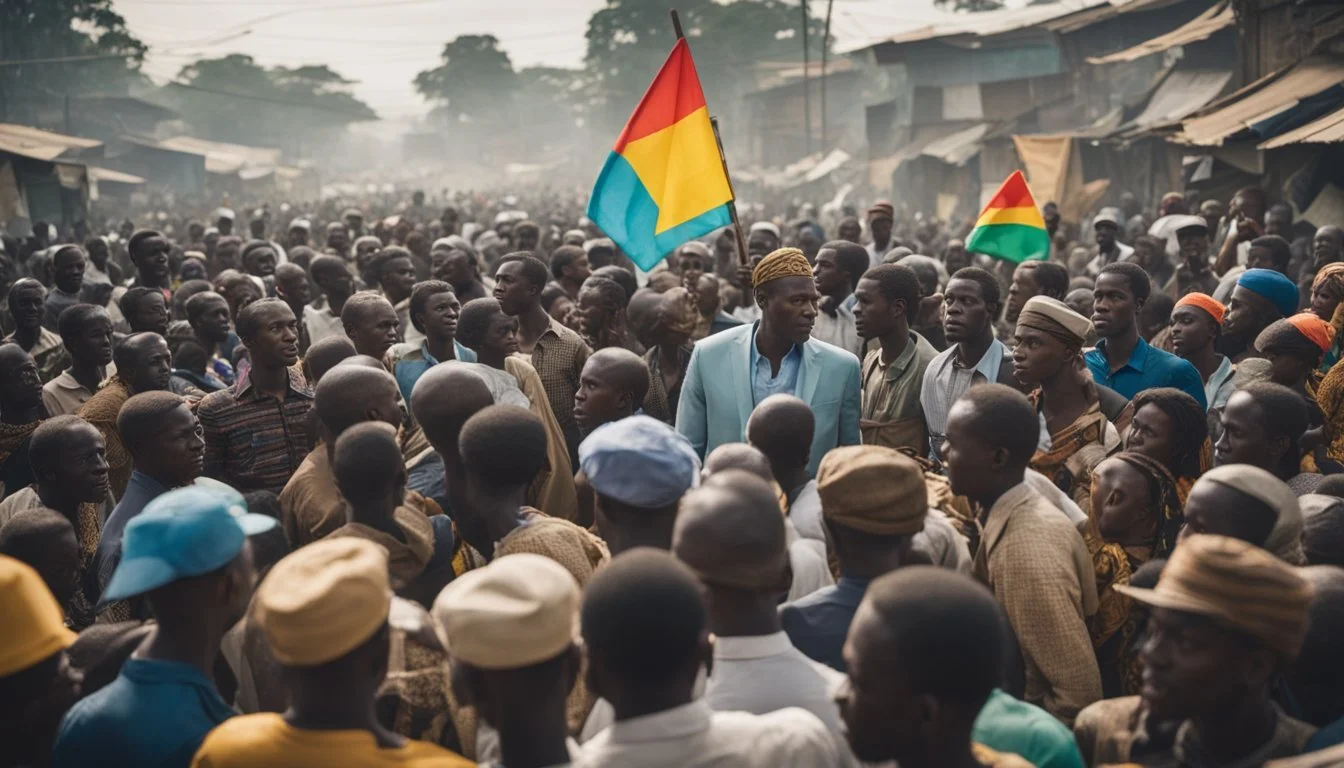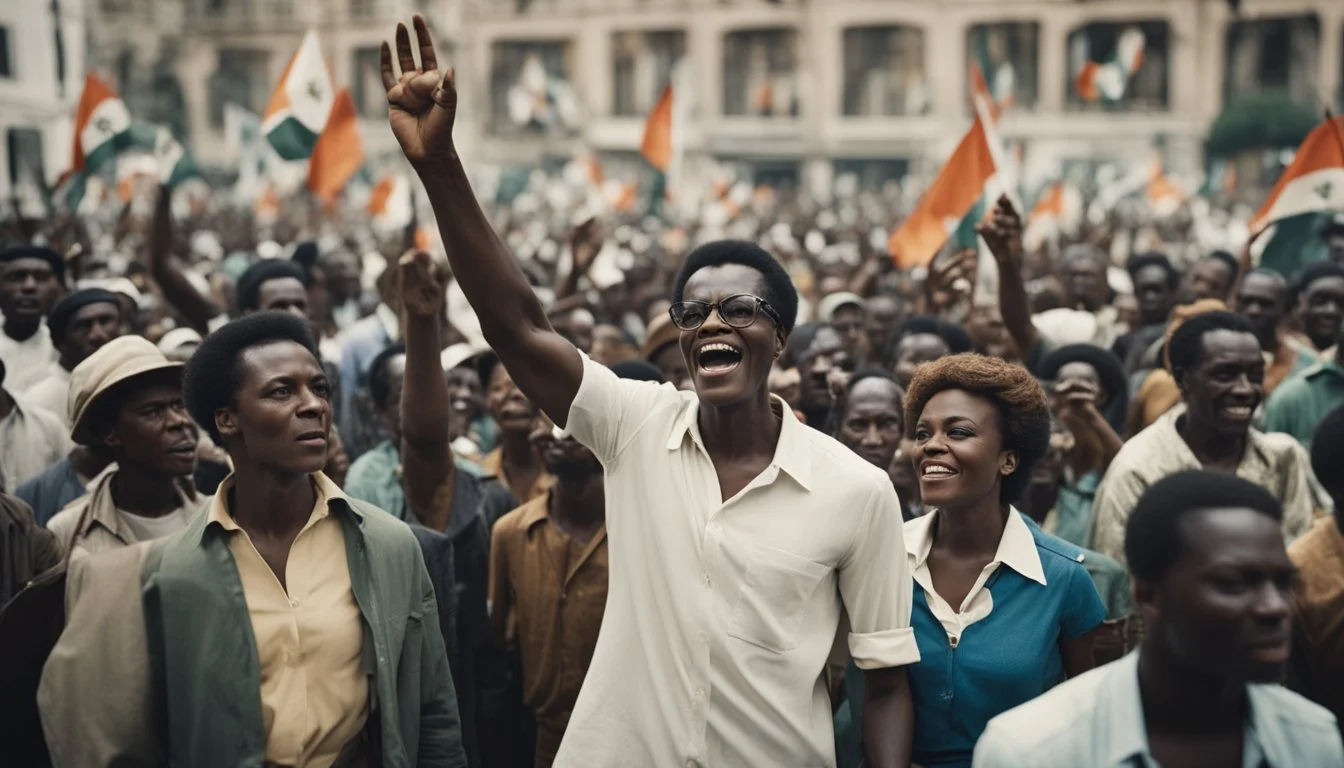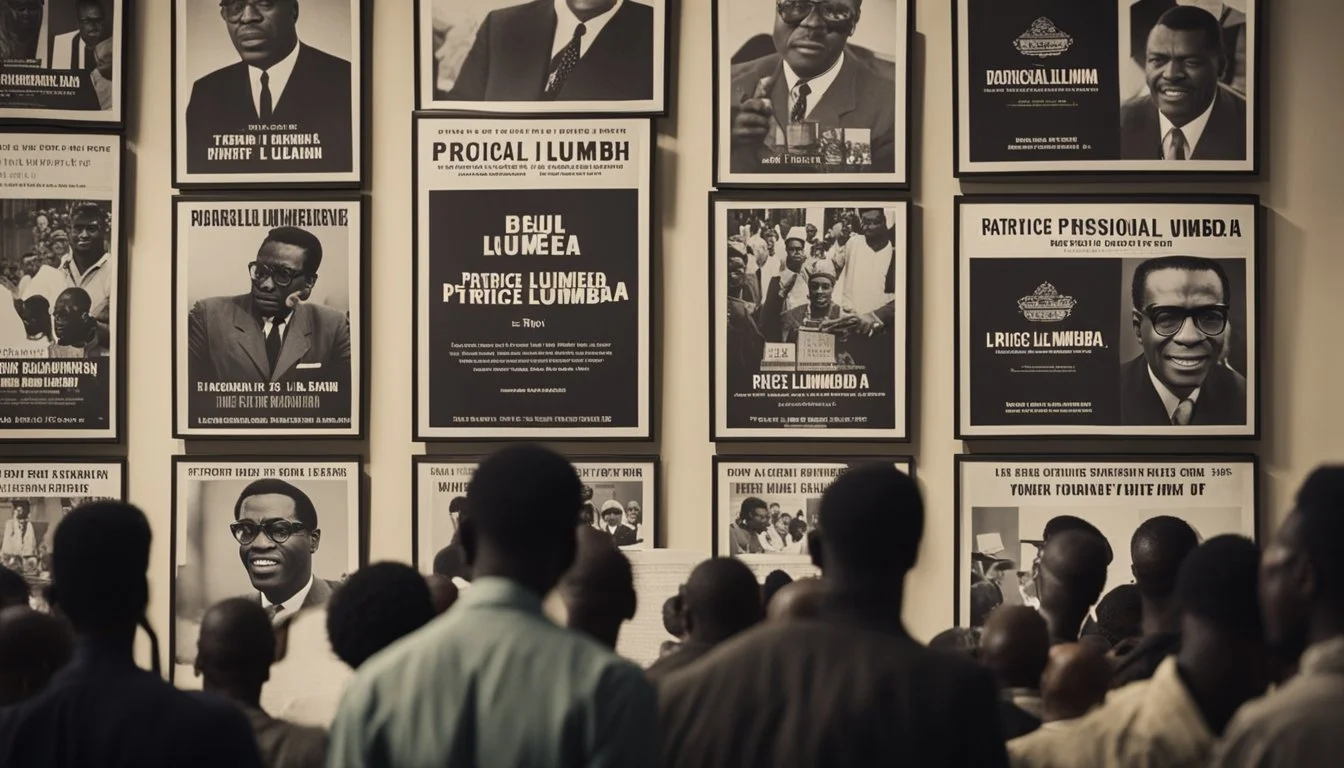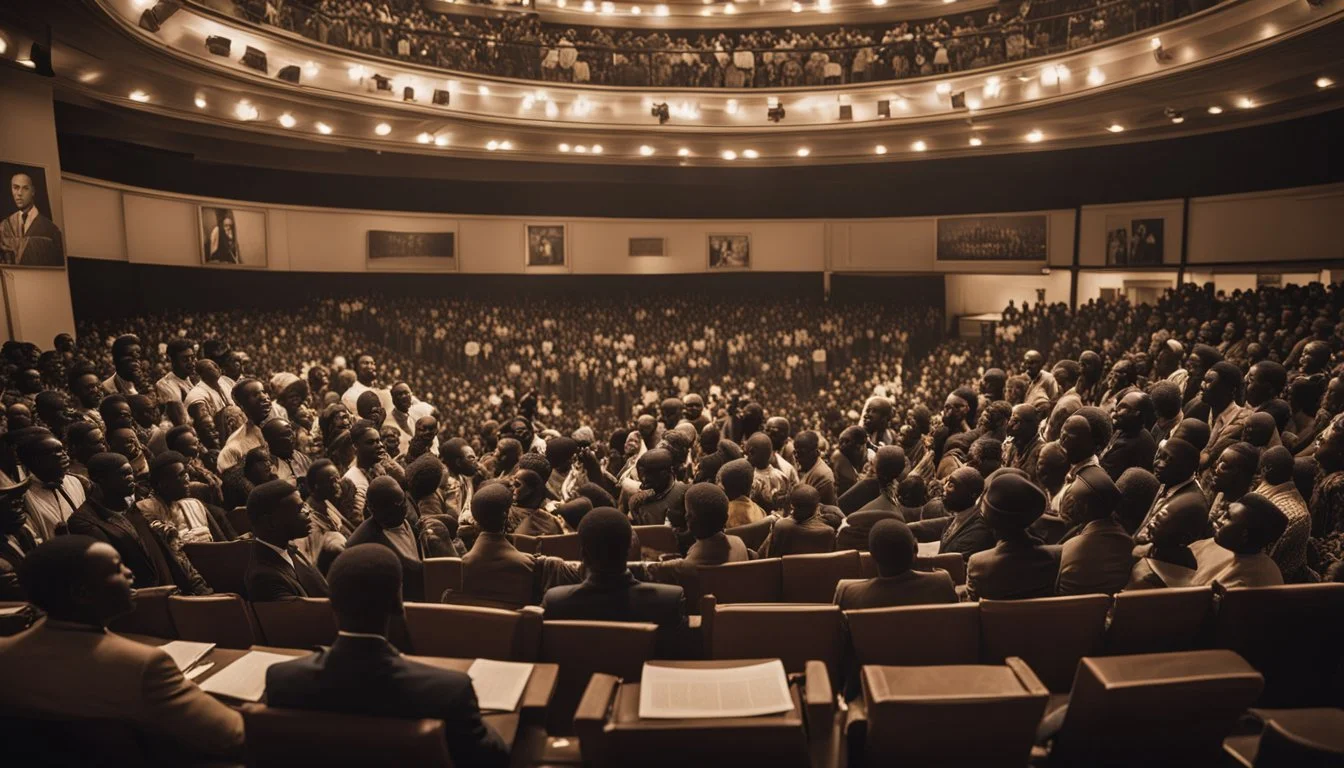10 Documentaries on the Political Impact of Patrice Lumumba
Essential Viewing
Patrice Lumumba, the first prime minister of the Democratic Republic of Congo, remains a seminal figure in African politics for his role in the country's liberation from Belgian colonization. His brief but impactful political leadership continues to inspire numerous documentaries that explore his enduring legacy and the broader implications of his vision for Pan-African unity.
For those interested in the intersection of African history and political documentary filmmaking, understanding Lumumba's influence offers valuable insights. This article examines ten documentaries that capture the complex dynamics surrounding Lumumba's life, his contributions to decolonization, and the geopolitical struggles that defined his era.
1) Lumumba: Death of a Prophet (1990)
"Lumumba: Death of a Prophet" is a 1990 documentary directed by Haitian filmmaker Raoul Peck. The film examines the life, political career, and assassination of Patrice Lumumba, the first Prime Minister of the Republic of Congo.
The documentary is personal and political. Raoul Peck, who spent part of his childhood in the Congo, reflects on Lumumba's significance and his own memories.
The film critically explores Cold War-era politics and the global reactions to Lumumba's leadership and subsequent assassination. It includes archived footage and interviews that paint a vivid picture of the international and domestic challenges Lumumba faced.
"Lumumba: Death of a Prophet" has been praised for its insightful analysis. It received critical acclaim and was shown at several film festivals, including the Cannes Film Festival.
For more details about the documentary, you can visit its Wikipedia page.
2) Patrice Lumumba: Twelve Days that Shook the Congo
"Patrice Lumumba: Twelve Days that Shook the Congo" (2001) captures the intense period following Congo's independence on June 30, 1960.
This documentary explores Lumumba's quick rise as the first Prime Minister and his subsequent assassination. The film delves deep into the political environment of the time, offering insights into the struggles for power in a newly independent Congo.
Filmmakers provide detailed accounts of the socio-political landscape, allowing viewers to grasp the immense challenges Lumumba faced. They examine his efforts to unify the nation against the backdrop of Cold War geopolitics.
This film underscores the tension between nationalist movements and external influences, particularly the interplay between Congolese leaders and foreign powers like Belgium and the United States.
"Patrice Lumumba: Twelve Days that Shook the Congo" highlights the brutal realities of post-colonial Africa and the tragic demise of one of its most pivotal figures. Through archival footage and expert interviews, it paints a visceral picture of Lumumba's legacy.
For more information, visit IMDB.
3) Africa: The Blood and Power of Patrice Lumumba
Patrice Lumumba's influence on Africa's political landscape remains profound. His fervent push for Congolese independence and his tragic assassination symbolize a broader struggle for African autonomy in a Cold War context.
"Lumumba: Death of a Prophet" (1990) explores Lumumba's role and legacy, using a deeply personal approach to tell his story. The documentary captures the mythic stature he still holds. More Information
"Soundtrack to a Coup d'Etat" (2020) dives into the geopolitical intricacies that led to Lumumba's death. This film scrutinizes the complicity of Western powers in destabilizing post-colonial Africa. More Information
"Patrice Lumumba: A Revolutionary Feared by the West" (Date Unknown) emphasizes Lumumba’s fiery speech during Congo's independence day, which foreshadowed the turbulence ahead. The documentary highlights the tension between Lumumba's vision and Western interests. More Information
Each documentary offers unique insights into how Lumumba's leadership sparked hope and resistance, and how his assassination represented a pivotal moment in African history. These films serve as essential resources for understanding the complexities of this influential leader's life and its far-reaching impact on Africa.
4) The Struggle for Independence: Patrice Lumumba
Patrice Lumumba was a central figure in the fight for the Congo's independence from Belgium. Born in 1925, Lumumba emerged as a leader of the Congolese National Movement. His powerful oratory and vision for a unified Congo inspired many to join the cause against colonial rule.
In 1960, he became the first Prime Minister of the Democratic Republic of the Congo. His tenure, though brief, was marked by significant efforts to eradicate the remnants of Belgian control.
Lumumba's speeches highlighted the injustices and exploitation faced by the Congolese people under Belgian administration. His calls for true independence were both a rallying cry for Congolese nationalists and a threat to Western powers.
Lumumba's commitment to independence made him a target. Within a year of becoming Prime Minister, he was assassinated, a tragic end influenced by the geopolitical dynamics of the Cold War and foreign interests in the region. Despite his short-lived leadership, Lumumba's legacy lives on as a symbol of African resistance and aspiration for true sovereignty.
5) Lumumba’s Legacy: The African Continent
Patrice Lumumba’s struggle for Congolese independence has had a profound impact on the African continent. His unwavering commitment to self-determination and social justice became a beacon for other African nations seeking freedom from colonial rule.
His assassination in 1961 amplified his status as a martyr, and he is often remembered as a symbol of pan-African unity and resistance against foreign exploitation.
Lumumba's legacy extends beyond politics. He inspired cultural movements, literature, and art across Africa. His story resonates in the struggle against neo-colonialism and in ongoing efforts for economic and social reforms.
The principles he championed continue to influence the policies and ideologies of various African governments and political entities today. Many contemporary African leaders cite Lumumba as a pivotal figure in their political development.
6) The Assassination of Patrice Lumumba
The assassination of Patrice Lumumba, the first Prime Minister of the independent Democratic Republic of the Congo, occurred in a context marked by political turmoil and external meddling.
On January 17, 1961, Lumumba was executed by a firing squad in Katanga, a breakaway province backed by Belgium. His death was a direct result of the political instability that surrounded Congo's early years of independence.
Lumumba had been a controversial figure, both admired and feared. He was seen as a beacon of hope for African nationalism and independence. His policies and rhetoric, however, made him a target for Western powers who were wary of losing influence in the region.
The involvement of Belgian officers in Lumumba's assassination underscores the extent of foreign interference in Congolese affairs. The event sparked outrage and led to numerous conspiracies and debates about the role of international powers in shaping post-colonial Africa.
This tragic event has been the subject of several documentaries. These films explore the circumstances and aftermath of Lumumba's death, providing insights into the geopolitics of the time and the lingering impact on Congo.
For further details about the assassination, visit this film's IMDb page (2000).
7) Histories of National Liberation: Lumumba's Influence
Patrice Lumumba remains a symbol of national liberation and anti-colonial struggle. His impact extended beyond the borders of the Democratic Republic of Congo, influencing liberation movements across Africa. Lumumba's vision of a united, self-governing Africa inspired many leaders and activists.
Lumumba's firm stance against colonial powers, especially Belgium and the United States, resonated with pan-African sentiments. His speeches and public appearances echoed the dreams of independence and self-determination, motivating numerous Africannationalists.
The brutal assassination of Lumumba in 1961 turned him into a martyr for the liberation cause. It galvanized resistance movements that recognized the need to fight external interference for genuine independence.
After his death, Lumumba's ideas continued to thrive. His dedication to overcoming imperialist oppression offered a template for other nations seeking liberation. Instead of fading, his legacy grew.
University campuses across Africa revered Lumumba as a beacon of hope and resistance. He is remembered as a figure whose ideological contributions were instrumental in shaping the political landscapes of postcolonial Africa.
For further insight into Lumumba's influence on national liberation movements, the documentaries listed in this article provide an in-depth exploration of his life and legacy. These films illustrate how Lumumba's political life continues to inspire generations.
8) BBC's Patrice Lumumba Documentary
The BBC's documentary on Patrice Lumumba, released in 1999, provides an insightful look into the life and death of the Congolese leader. It focuses on Lumumba's role in Congo's struggle for independence from Belgian colonial rule.
The documentary highlights Lumumba's rise to prominence and his passionate speeches, which galvanized many Congolese to support independence.
A key part of the documentary examines the political turmoil following Congo's independence. This includes Lumumba's brief tenure as the first democratically elected prime minister and the subsequent chaos that led to his assassination.
Interviews with historians, political analysts, and individuals who knew Lumumba personally are featured. These interviews provide depth and various perspectives on his legacy and the impact of his death on the Congo.
The film also covers Belgium's controversial involvement and the role of other international powers, such as the United States, in Lumumba's downfall.
The documentary is a crucial resource for anyone interested in understanding colonial history and the complexities of post-colonial African politics.
More information about this documentary can be found on its IMDb page.
9) Patrice Lumumba: Hero of Independence
Patrice Lumumba stands as a symbol of Congo's struggle for independence from Belgian colonial rule. As the first democratically elected Prime Minister of the Democratic Republic of the Congo, Lumumba played a crucial role in the nation's fight for self-governance.
Born in 1925, Lumumba was not only a politician but also a pan-Africanist and social activist. His fervent speeches and unwavering dedication galvanized many to support the independence movement. Lumumba's vision for a united and free Africa inspired movements across the continent.
Amid his political career, Lumumba faced numerous challenges. He was even imprisoned for a period due to accusations of embezzlement. Despite these setbacks, his resolve remained steadfast, pushing for a Congo free from foreign dominance.
Lumumba's tenure as Prime Minister marked significant progress towards independence, yet it also attracted significant foreign opposition. His leadership was met with internal strife and external pressures that ultimately led to his tragic assassination in 1961.
His legacy endures, with many considering him a martyr for African independence. Documentaries about Lumumba provide deep insights into his life, struggles, and the enduring impact he left behind. They serve as educational resources for understanding the complexities of African decolonization.
For more information about Patrice Lumumba and his impact on African independence, refer to IMDB or Wikipedia.
10) Echoes of Lumumba in African Politics
Patrice Lumumba's legacy continues to resonate deeply within African politics. His vision for a united and independent Congo set a precedent for anti-colonial movements across the continent. Many African leaders draw inspiration from his commitment to sovereignty and social justice.
After his assassination in 1961, Lumumba became a symbol of resistance against imperialism. His political ideals influenced numerous liberation movements, emboldening leaders to push back against foreign control.
Even decades later, Lumumba's name invokes a sense of pride and determination among African politicians who champion self-determination. They often cite his speeches as foundational texts for understanding the fight for genuine independence.
The Pan-Africanist ideologies that Lumumba advocated continue to shape policies of economic independence and political unity within bodies such as the African Union. His emphasis on African identity over colonial heritage is echoed by contemporary leaders seeking to reclaim cultural narratives.
Patrice Lumumba's influence extends to public policy, where his ideas about resource distribution and equitable governance still inspire debates. These principles are reflected in discussions about fair trade and the management of natural resources in Africa today.
Historical Context of Patrice Lumumba
Patrice Lumumba emerged as a central figure in the fight for Congolese independence, rapidly ascending from humble beginnings to becoming the first Prime Minister of the Democratic Republic of the Congo. His leadership was instrumental in navigating the turbulent waters of post-colonial power structures.
Colonial Congo and the Independence Movement
Belgium colonized Congo in the late 19th century, extracting vast resources and imposing strict European rule. The Congolese people suffered exploitation and severe social stratification. The Belgian colonial government had little interest in educating or politically empowering the local population, leading to widespread disenfranchisement.
Post-World War II, decolonization movements gained momentum in Africa. Congo was no exception, witnessing growing demands for self-governance. By the late 1950s, these demands became impossible to ignore. Lumumba emerged as a leader, rallying for independence. His persuasive rhetoric and political activism unified various ethnic groups and factions.
Early Life and Rise to Prominence
Patrice Lumumba was born on July 2, 1925, in Onalua, a village in the Belgian Congo. Raised in modest conditions, he excelled in education despite limited opportunities. He worked various jobs, including as a postal clerk, where he gained exposure to anti-colonial ideas.
Lumumba's political career began with his involvement in the Congolese National Movement (MNC). Known for his charismatic speeches and visionary ideas, he quickly attracted a following. His advocacy for independence and social justice found resonance among the Congolese masses.
In 1960, Congo gained independence from Belgium, and Lumumba became the nation's first Prime Minister. His tenure was short-lived, marked by political instability and external interference, but his impact on the independence movement and African nationalism remains significant.
Patrice Lumumba's Political Philosophy
Patrice Lumumba, the first Prime Minister of the Democratic Republic of Congo, was deeply influenced by the ideals of Pan-Africanism and harbored strong opposition to colonialism. His political philosophy is best understood through his views on Pan-African integration and his relentless struggle against imperial rule.
Views on Pan-Africanism
Patrice Lumumba was a staunch supporter of Pan-Africanism, a movement advocating for the solidarity and unity of African nations. He believed that African countries should work together to achieve political and economic independence from colonial powers.
Lumumba argued that the collective strength of African states could counter external manipulations and exploitations. His speeches often called for an African federation, emphasizing common cultural and historical ties.
Lumumba’s participation in the All-African Peoples' Conference exemplified his commitment to this cause. He championed the idea of African nations building institutions that reflect their values and priorities. Unity, sovereignty, and shared progress were the cornerstones of his vision for a self-reliant and empowered Africa.
Struggle Against Colonialism
Lumumba was a fierce opponent of colonialism and dedicated much of his political career to fighting for Congo's independence from Belgium. He wanted to eradicate all forms of colonial influence and ensure that Congolese resources benefited the local population, not foreign powers.
Through his leadership in the Congolese National Movement, he mobilized masses against the injustices of colonial rule. His famous Independence Day speech on June 30, 1960, displayed his uncompromising stance against colonialists. He openly criticized the Belgian presence and called for true national sovereignty.
Lumumba's anti-colonial efforts extended beyond Congo. He was deeply aware of the broader geopolitical context, recognizing that colonialism in Africa was part of a global pattern of exploitation. He sought partnerships with other newly independent nations to create a united front against imperialist powers, reinforcing his commitment to both Congo’s and Africa’s liberation.
Impact of Lumumba's Assassination
Patrice Lumumba's assassination had profound consequences both within the Congo and on the global stage. The effects were immediate and far-reaching, influencing political dynamics and international relations.
Immediate Effects on Congo
The immediate impact in Congo was severe. Lumumba's assassination plunged the newly independent nation into political chaos and heightened ethnic tensions.
A power vacuum emerged that various factions sought to fill, leading to a protracted period of instability. This environment fostered the rise of dictatorial rule, epitomized by Mobutu Sese Seko, who eventually took control through a coup.
The assassination also alienated many Congolese people from their government. Lumumba was seen by many as a symbol of independence and anti-colonialism, and his death was perceived as a betrayal of these ideals. This sentiment fueled further unrest and resistance movements.
International Reactions
Internationally, Lumumba's assassination sparked widespread outrage and condemnation. Many African nations saw it as a stark example of neocolonial interference by Western powers, particularly Belgium and the United States. Protests swept across multiple continents, with demonstrators calling for justice and a reevaluation of foreign policies.
Global powers found themselves reassessing their strategies. The Cold War context complicated matters, as both the Soviet Union and the United States sought to exert influence in Africa. The event underscored the volatile nature of post-colonial geopolitics, marking a significant shift in how newly independent nations were perceived on the world stage.
In the ensuing years, Lumumba's legacy continued to inspire movements for social justice and liberation, making his assassination a pivotal moment in 20th-century history.
Legacy and Lasting Influence
Patrice Lumumba's legacy extends through both the political landscape of modern Africa and various cultural representations and memorials. His influence is marked by his contributions to the fight for independence, and the ways artists and historians remember him.
Lumumba's Role in Modern African Politics
Patrice Lumumba is a symbol of African independence and self-governance. His leadership during the Congo's struggle against Belgian colonial rule set a precedent for other African nations. He advocated for true sovereignty, free from foreign interference.
Many African leaders and political movements have drawn inspiration from Lumumba’s ideals of unity and self-determination. His vision for a pan-African identity influences contemporary political discourse in the region. Lumumba’s speeches and writings continue to inspire leaders who seek to challenge neo-colonialism and global inequality.
Despite his assassination in 1961, Lumumba's political principles continue to resonate in policy-making and activism across Africa. Various anti-colonial movements often reference his legacy when discussing the continent's ongoing battle against external exploitation.
Cultural Representations and Memorials
Patrice Lumumba's life and struggle have been immortalized through various documentaries, films, books, and public displays. These representations aim to preserve his memory and educate future generations about his contributions.
The 2019 documentary, "From Patrice to Lumumba," by Patrick Kabeya, for instance, narrates his journey from a critical perspective and highlights his impact on the Congo's liberation. Memorials and statues in Lumumba's honor are found throughout Africa, serving as reminders of his sacrifice and ideals.
In education, Lumumba is featured in the curricula of numerous African schools, ensuring that his story remains accessible. Art and literature also celebrate his life, reinforcing his status as an enduring symbol of resistance against oppression.







